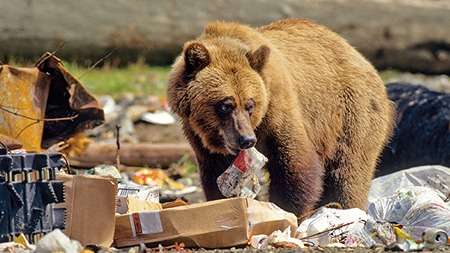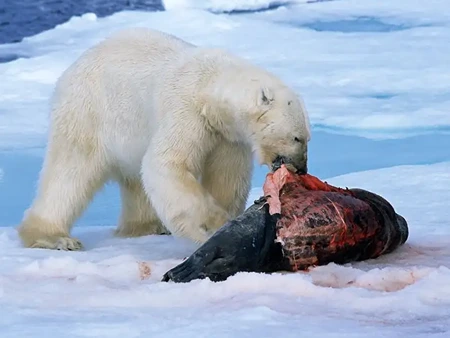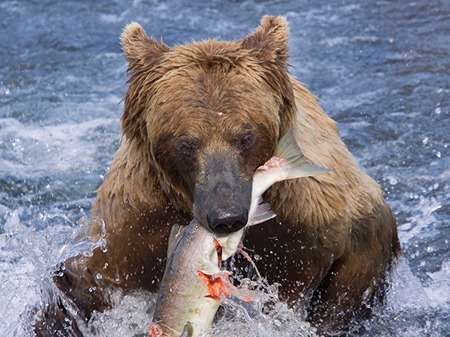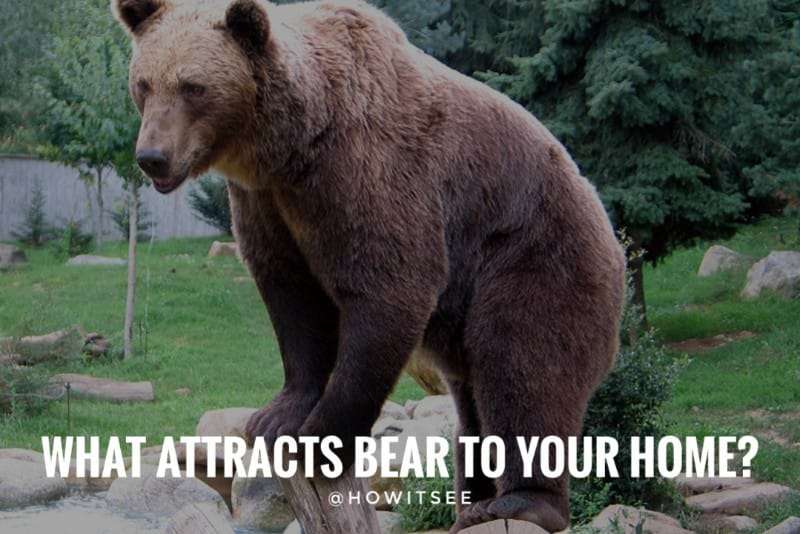The skyrocketing human population has caused a widespread cataclysm. Everything has been on the rise, from mass deforestation to glacial melts, from forest fires to human-wildlife conflict. The felling of trees to accommodate the burgeoning homo-sapiens community has been the root cause of all human-wildlife cases.
Among the many animals whose territory now intersects with the invasive humans, bears hold up quite a major share. With rising cases day by day like entering into houses, taking away edible items, etc., people are constantly in the search for some repellent measures.
Therefore, to address this issue, we bring before you our today’s article, What Attracts Bears to your Home? & How to Avoid them?
At first, let’s hover over what food items attract these bulky, furry creatures to your houses.
1. Food
Bears are the biggest foodies one will encounter in the wild. They are opportunistic feeders and are always on the hunt for food. From berries to carcasses, grasses to highly nutritious Atlantic Salmon bears love them all.
Food items that attract bears
Just like humans, Bears are omnivorous creatures. This implies they forage on animal matter, like meat, fish, and eggs, along with plant products like fruits, seeds, grains, etc. With habitat loss and lack of prey, bears often come searching for food in human settlements.
These creatures look for high-calorie foods, which they can obtain with the least effort. So, first and foremost, let us see some food items that attract bears.

Bears are equipped with a keen sense of smell. So anything that emits a scent, be it mouth-watering or pungent-rotting, bears will come around, looking for it. Foods like frying bacon, pet food, fragrant fruits, raw meat, milk products, garlic, onion, fermented foods, or even our-evening snacks can serve as dinner calls for bears.
Kitchen wastes like leftover food, unused parts of meats, bones, eggshells, fruit peels, etc., which go into the bin as a regular practice, may bring in bears.
Fish serves to be an excellent bear attractor, as it’s one of their favorite foods. So any unused parts, like scales and internal organs, will surely witness these curious creatures lurking around.
As an answer to what attracts bears, water can also attract bears, as seen in multiple cases. Often, due to the unavailability of water in the woods, with dried water sources, bears resort to swimming pools in the vicinity. The water is used for drinking and also for relaxation to beat the heat. Therefore, any water sources or foods are what attract bears.
Food that does not attract bears
Food items have always attracted bears, be it cooked, uncooked or rotting. Anything that emits an odor, be it appetizing or pungent, bears are sure to come, looking around for it.
Therefore, there aren’t any food items that do not attract bears. However, there are ways to keep bears away, which we will be discussing in our next segment.
How to avoid
- Garbage is an unavoidable aspect of our daily lifestyle. Keeping garbage bags out in the open, or bins, in regions are bears are regular visitors can be a nuisance. Therefore, we need to make garbage disposal as efficient as possible. We need to make sure the wastes do not lie in the open, as their smell will attract bears from far.
- If the garbage bags have meat, eggs, or fish discards, do not allow them to lie around. Store the garbage indoors until collection time, and keep it out at a time close to pick-up.
- Barbecue grills, with sticking pieces of meat, can be a calling for bears, so regular cleaning is a must. Fruits and vegetables growing in the garden must be picked as quickly as possible, as they are excellent bear attractors.
- Bear-proof metal bins are now on the market and are proving to be an effective way of garbage collection.
2. Smell
Bears have a wonderful scent smell, even exceeding those of dogs. They are known to have the keenest sense of smell in the animal kingdom. So, let us discuss what scents attract bears and what deters them.
Smells that will attract bears
Bears are attracted to a wide spectrum of scents. Anything that emits an odor is sure to call these inquisitive creatures in. The scent of leftover foods, raw meat, fish, vegetable peels, fruits, eggshells, or even human fecal matter can attract bears.
Bird feeders that are filled with grains to support the local bird population are often seen to attract bears. Often, we leave pet bowls outside our houses. Its smell also attracts them. Even rotting items and compost that emit a pungent smell are enough to make a bear lurking nearby.
Smells that will deter bears
Till now, we have known the plethora of scents that will attract bears. In this segment, we are going to know about the odors that will deter them. Though quite a few, these scents and methods have been proved to repel bears to quite a great extent.
Firstly, we have Neem oil. Well, apart from its antifungal and antibacterial properties, Neem oil can deter bears. Its scent is something bears don’t seem to like. Secondly, pine oil or pine solution has proven effective in deterring bears, as they like to stay away from it.
Cider vinegar, ammonia, and Lysol might greatly help to keep away bears from your vicinity.
How to avoid:
Let’s be honest, readers; it’s not possible to prevent waste, right? At length, we can minimize it but cannot prevent it. But, we can make sure our wastes do not attract bears. Following are a few measures that you can take to keep bears away.
- Pine Oil- It has been proven that pine oil has a repelling effect on bears, as they seem to not like the smell. Spraying pine oil or its solution on garbage bins or in patches around the house may be useful to deter bears. If you are camping and are afraid of a bear encounter, you can spray it around or in a cloth and hang it.
- Cider vinegar- This is another effective product and is pretty easy to put to use. Soak a cloth or a cotton ball in cider vinegar, and hang it around the house or in places which you think might attract bears.
Every Bear’s favorite food:
1) Polar Bears:

Polar bears live in the ice-cold Arctics and are well adapted to live in the freezing climate. They are the apex predators in the region. Among the many animals they consume, Ringed seals are their favorite food.
Apart from it, they consume other seal species, beluga and other whale carcasses, walruses, and sometimes vegetation like kelp.
2) Black Bears:
These species of bears are opportunistic feeders, and their diet consists of a wide spectrum of items. These are omnivorous in a true sense and feed on fruits, berries, fishes, small mammals, fishes, and carcasses of other animals.
They are the most common bears to infiltrate human settlements and eat items from garbage bins and other leftovers. Since plant products serve to be their chief diet, grasses are Black Bear’s favorite food.
3) Grizzly bears:

Grizzly bears are omnivorous too. They consume mostly grasses, fruits, berries, and roots but depend on fish and carcasses for their protein supplement.
Grizzlys are hibernating creatures, and they feed a plethora of food before their long slumber. The seeds of White-bark Pine are also one of their favorite foods.
4) Brown Bears:
Brown bears, like their other relatives, forage on a plethora of items. They feed on plant products like grasses, fruits, berries, roots, etc. For proteins, these creatures eat deer, elk, fish, and other animals.
The Alaskan Salmon is one of their favorite diets, as they flock near rivers, where these fishes swim upstream for spawning.
5) Panda Bear:

Pandas are undoubtedly one of the cutest creatures on the planet. Their diet mostly consists of vegetation, with bamboo comprising 90% of it. So, without any second thought, bamboo is the Panda Bear’s favorite food.
What to feed bears?
Now since you have got to know, what attracts Bears, let’s address a popular question, What to feed bears. Well, to know what to feed bears, we might have to hover over a few aspects. When the question arises of what to feed bears, we should keep in mind that the subject is captive bears, as in a zoo.
In such cases, you can give them food that involves meat, fish, and eggs for protein and calcium supplements. On the other hand, plant parts like fruits, berries, and roots can serve to be their source of fibers.
Their food habits need to be regulated so that they are not overfed and become obese. Feeding should be done based on their daily physical activities after consultation with a veterinary nutritionist.
Wild bears should never be fed, either directly or indirectly. As mentioned earlier in this article, bears are opportunistic feeders. They will look for maximum calories with the least effort.
Feeding wild bears will make them dependent on us for their food source, which will interfere with nature’s natural cycle. This will also greatly affect their survival in the wild.
Apart from this, materials for human consumption may contain certain substances that might be harmful to bears. The feeding practice will eventually make them fearless and may attack humans in turn.
Taking away their instinct to hunt and look for food will indirectly affect other creatures dependent on them for survival.
This is where we conclude our post on What Attracts Bears to your Home? & How to Avoid them? We will return soon, with another informative article, with answers to various curious questions. Until then, Stay Tuned.
Also Read:

Meet Abhidept (nickname Monty), the visionary founder of How It See, being an engineering student, he’s fueled by an insatiable curiosity about the world around him. He is captivated by an eclectic correlation between animal groups, science, and nature, and this fascination drives his quest for understanding.
After completing his degree, he’s set on a mission to delve deep into the realm of nature, accumulating knowledge to share with you through his writing. In the meantime, he loves to watch anime and read anime.
